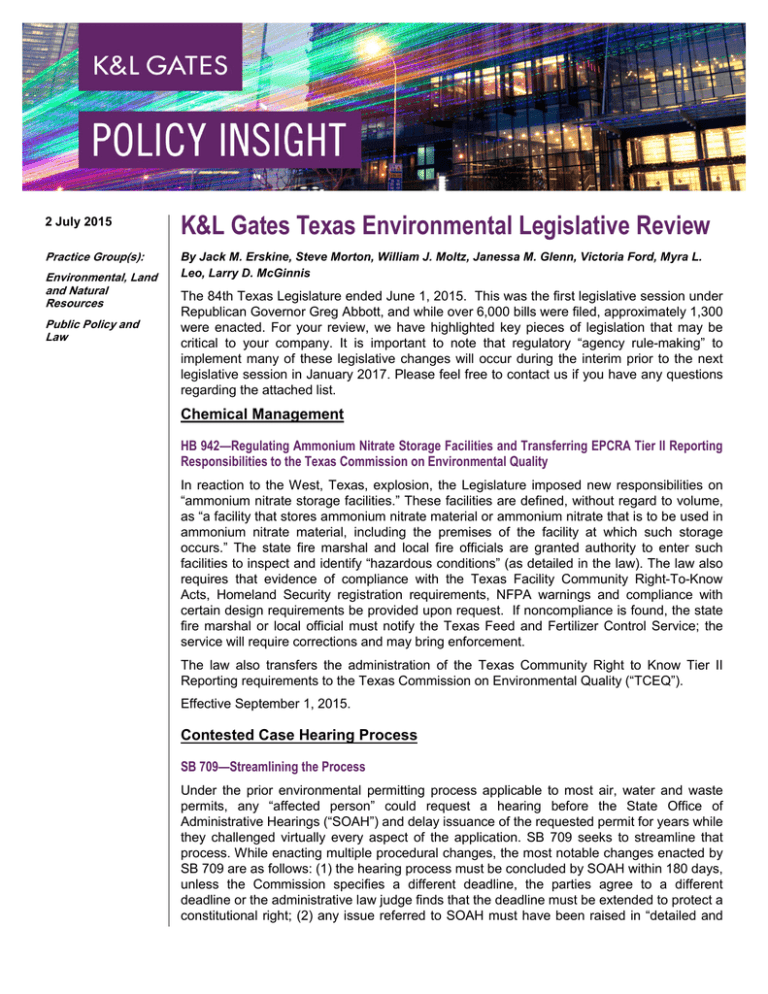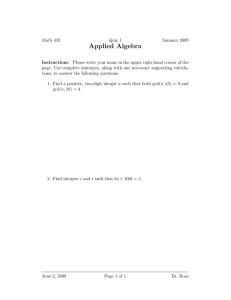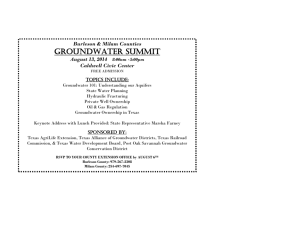
2 July 2015
Practice Group(s):
Environmental, Land
and Natural
Resources
Public Policy and
Law
K&L Gates Texas Environmental Legislative Review
By Jack M. Erskine, Steve Morton, William J. Moltz, Janessa M. Glenn, Victoria Ford, Myra L.
Leo, Larry D. McGinnis
The 84th Texas Legislature ended June 1, 2015. This was the first legislative session under
Republican Governor Greg Abbott, and while over 6,000 bills were filed, approximately 1,300
were enacted. For your review, we have highlighted key pieces of legislation that may be
critical to your company. It is important to note that regulatory “agency rule-making” to
implement many of these legislative changes will occur during the interim prior to the next
legislative session in January 2017. Please feel free to contact us if you have any questions
regarding the attached list.
Chemical Management
HB 942—Regulating Ammonium Nitrate Storage Facilities and Transferring EPCRA Tier II Reporting
Responsibilities to the Texas Commission on Environmental Quality
In reaction to the West, Texas, explosion, the Legislature imposed new responsibilities on
“ammonium nitrate storage facilities.” These facilities are defined, without regard to volume,
as “a facility that stores ammonium nitrate material or ammonium nitrate that is to be used in
ammonium nitrate material, including the premises of the facility at which such storage
occurs.” The state fire marshal and local fire officials are granted authority to enter such
facilities to inspect and identify “hazardous conditions” (as detailed in the law). The law also
requires that evidence of compliance with the Texas Facility Community Right-To-Know
Acts, Homeland Security registration requirements, NFPA warnings and compliance with
certain design requirements be provided upon request. If noncompliance is found, the state
fire marshal or local official must notify the Texas Feed and Fertilizer Control Service; the
service will require corrections and may bring enforcement.
The law also transfers the administration of the Texas Community Right to Know Tier II
Reporting requirements to the Texas Commission on Environmental Quality (“TCEQ”).
Effective September 1, 2015.
Contested Case Hearing Process
SB 709—Streamlining the Process
Under the prior environmental permitting process applicable to most air, water and waste
permits, any “affected person” could request a hearing before the State Office of
Administrative Hearings (“SOAH”) and delay issuance of the requested permit for years while
they challenged virtually every aspect of the application. SB 709 seeks to streamline that
process. While enacting multiple procedural changes, the most notable changes enacted by
SB 709 are as follows: (1) the hearing process must be concluded by SOAH within 180 days,
unless the Commission specifies a different deadline, the parties agree to a different
deadline or the administrative law judge finds that the deadline must be extended to protect a
constitutional right; (2) any issue referred to SOAH must have been raised in “detailed and
K&L Gates Texas Environmental Legislative Review
complete” comments submitted by the affected person during the public comment period; (3)
the draft permit and preliminary decision of the executive director is presumed to comply with
relevant legal requirements and the affected person must rebut that presumption; and (4) the
general principles regarding the Commission’s determination of whether a person is an
“affected person” entitled to a hearing that have recently been utilized by Texas courts to
uphold the Commission’s decision were, for the most part, codified into the statute. The
degree to which SB 709 actually results in a streamlined permitting process will depend, to a
great degree, on how the changes mandated by SB 709 are applied through rulemaking and
in practice by the Commission and SOAH.
Effective September 1, 2015.
Enforcement
HB 1794—Local Governments Limited on Environmental Penalty Issuance
Local governments have long had the authority to sue individuals and entities to collect
penalties for environmental violations. These lawsuits have recently proliferated to include
large civil penalty amounts, and for historical contamination. This bill attempts to reign in
such lawsuits. First, any civil penalty recovered by a local government for up to $4.3 million
must be divided evenly between the state and the local government. Amounts over that
threshold are recovered entirely by the state. Further, the amount of the civil penalty
assessed by the local government is now subject to an analysis of certain factors by the trier
of fact, which includes the effect of the violation and the good-faith efforts to come into
compliance, among others. Finally, the local government has a five-year statute of limitations
to bring suit.
Effective September 1, 2015.
Oil and Gas
HB 40—State Preempts Some Local Oil and Gas Regulation
This law was enacted in response to the City of Denton’s attempts to regulate oil and gas
operations. Under this new law, effective immediately, some, but not all, aspects of oil and
gas operations are subject to exclusive state regulation. These activities join a list of other
activities that the Legislature has determined should be solely regulated by the state,
including solid waste landfills and commercial hazardous-waste landfills. The law prohibits a
municipality or other political subdivision from regulating an oil and gas operation within city
limits or extraterritorial jurisdiction, with certain broad exceptions. Local government is
allowed to enact “commercially reasonable” controls over the aboveground activity of an oil
and gas operation as long as that control does not effectively prohibit an oil and gas
operation conducted by a “reasonably prudent operator.” The terms “oil and gas operation,”
“commercially reasonable,” and “reasonably prudent operator” are defined by the new law,
and will likely be the subject of further interpretation through the courts, as the boundaries of
the law are tested by local governments and operators. Certain ordinances already in
existence that control aboveground activities are considered prima facie commercially
reasonable if they have allowed the oil and gas operations to exist for at least five years.
Effective immediately.
2
K&L Gates Texas Environmental Legislative Review
HB 1331—Recycling Oil and Gas Waste
This law amends the Texas Natural Resources Code to clarify the ownership and
responsibility for recycled drill cuttings that are used for beneficial reuse. The legislation
places ownership of the drill cuttings that are to be recycled on the permit holder who is
doing the recycling until it is transferred to the user. It absolves the generator of the drill
cuttings from tort liability if there is a contract with the recycler that provides the recycler will
be putting the cuttings to beneficial use. The Texas Railroad Commission (“RRC”) will
engage in rulemaking to implement this new law.
Effective September 1, 2015.
HB 2230—Authorizes Disposal of Desalination Brine Into Oil and Gas Class II Disposal Wells
This law grants the TCEQ the authority to permit injection of brine from desalination projects
into an RRC-permitted Class II injection well. The TCEQ is authorized to grant a Class V well
permit to such wells either by individual permit, general permit, or by rule. The TCEQ and the
RRC will develop rules or enter into an MOA to coordinate this authorization.
Effective September 1, 2015.
Waste
HB 2598—Seeks to Keep Steel Slag from Being Defined as a Solid Waste in Texas
This law, effective September 1, 2015, prohibits the TCEQ from regulating electric arc
furnace steel slag as a solid waste even if placed on the ground, if the slag is managed as an
item of commercial value, and the use is a “controlled use.”
Effective September 1, 2015.
HB 281—Municipal Solid Waste Landfills
This amendment to Chapter 361 of the Texas Health and Safety Code (i.e., the “Solid Waste
Disposal Act”) prohibits a municipality from permitting the expansion of a Type 1 municipal
solid waste landfill permitted before 1980 which it owns within the boundary or extraterritorial
jurisdiction of another municipality, unless the municipality within which the expansion will
occur approves that expansion.
Effective immediately. Applies to any application pending on or after the effective date.
HB 2244—Medical Waste
The legislature determined that the current regulatory regime whereby medical waste is
regulated as a subset of municipal solid waste has the effect of subjecting medical waste to
many inappropriate regulatory requirements. To address this situation, HB 2244 requires that
the TCEQ adopt a new set of rules in a new chapter of the Texas Administrative Code which
separates the regulatory requirements of other municipal solid wastes from medical waste
and implements specific issues to be considered in matters relating to medical waste.
Effective immediately.
3
K&L Gates Texas Environmental Legislative Review
Water
HB 200—Challenging Desired Future Conditions; Chapter 36 Groundwater Conservation Districts
This law clarifies the purposes and procedures of Texas Water Code Chapter 36
Groundwater Conservation Districts (“GCD”). First, the law adds a new purpose of the GCD,
to “protect property rights.” Second, it requires GCDs to utilize “best available science” in the
development and conservation of groundwater, including rulemaking. Third, it sets out new
procedures and standards for approval of the GCD’s all-important “desired future conditions,”
which the District uses to regulate production of groundwater. The law changes who can be
an “affected person” permitted to challenge a desired future condition, who pays for a
hearing on that issue, the role of the SOAH, and the rights of appeal.
Effective September 1, 2015.
HB 2767—Groundwater Districts
This law relates to the operations of GCDs created under Section 59, Article XVI, of the
Texas Constitution. Specifically, HB 2767 clarifies that a GCD may impose fees, including a
fee to export water produced in the GCD out of the GCD, to fund its operations where a tax
to do so is not approved by the GCD’s voters; adopts standards for the financial audits of a
GCD; authorizes a GCD to adopt or repeal exemptions from the requirement to obtain any
type of permit from the GCD; specifies how the GCD is to determine the amount of the fee to
export water out of the GCD; limits judicial review of actions subject to a contested case
hearing to parties to that hearing; allows for a person to request an “inquiry” by TCEQ
relating to whether the GCD is properly carrying out its duties; removes the requirement that
land added to the GCD’s area by petition be contiguous to the GCD; and makes several
changes to the requirements applicable to the management and administration of the GCD.
Effective immediately.
HB 2031—Desalination of Marine Seawater
Under prior law, multiple approvals would be required to withdraw seawater from Texas
waters, discharge wastewater from a desalination plant, and use desalinated seawater as a
public water supply. HB 2031 streamlines this process by creating a new Chapter 18 of the
Texas Water Code relating solely to and consolidating the requirements applicable to
“Marine Seawater Desalination Projects.”
The resulting permit program will be implemented by the TCEQ. The Texas Parks and
Wildlife Department and the General Land Office are charged with undertaking a study to
determine the appropriate locations for such withdrawal and discharge. Further, TCEQ is to
adopt rules relating to use of desalinated seawater as a source of public drinking water.
Effective immediately.
HB 30—Requiring Consideration of Brackish Groundwater in Water Planning
With water demands increasing and supply decreasing, one potential untapped water supply
is the desalination of brackish groundwater. This bill recognizes the potential to increase
water supply for municipal and industrial purposes through desalination of brackish
groundwater, while protecting the current emerging use of this water in the oil and gas
4
K&L Gates Texas Environmental Legislative Review
industry. Each regional water planning group is now required to include in its regional water
plan consideration of use of desalinated brackish groundwater. Further, the Texas Water
Development Board is required to research both seawater and brackish groundwater
desalination as a potential water source, and to submit a biennial progress report to various
state representatives (including the governor), as well as complete other research tasks in
cooperation with other parties.
The biennial progress report includes a designation of production zones with potential for
moderate to high availability of brackish groundwater, but the groundwater located in the
Barton Springs/Edwards Aquifer Conservation District, the Harris-Galveston Subsidence
District, the Fort Bend Subsidence District, and portions of the Edwards Aquifer under the
authority of the Edwards Aquifer Authority are exempt from this identification process.
Effective immediately.
Authors:
Jack M. Erskine
Steve Morton
William J. Moltz
steve.morton@klgates.com
+1.512.482.6869
william.moltz@klgates.com
+1.512.482.6870
Janessa M. Glenn
Myra L. Leo
Victoria Ford
janessa.glenn@klgates.com
+1.512.482.6866
myra.leo@klgates.com
+1.512.482.6809
victoria.ford@klgates.com
+1.512.482.6813
jack.erskine@klgates.com
+1.512.482.6875
Larry D. McGinnis
larry.mcginnis@klgates.com
+1.512.482.6849
Anchorage Austin Beijing Berlin Boston Brisbane Brussels Charleston Charlotte Chicago Dallas Doha Dubai Fort Worth Frankfurt
Harrisburg Hong Kong Houston London Los Angeles Melbourne Miami Milan Moscow Newark New York Orange County Palo Alto Paris Perth
Pittsburgh
Portland
Raleigh
Research Triangle Park
San Francisco
São Paulo
Seattle
Seoul
Shanghai
Singapore
Spokane
Sydney Taipei Tokyo Warsaw Washington, D.C. Wilmington
K&L Gates comprises more than 2,000 lawyers globally who practice in fully integrated offices located on five
continents. The firm represents leading multinational corporations, growth and middle-market companies, capital
markets participants and entrepreneurs in every major industry group as well as public sector entities, educational
institutions, philanthropic organizations and individuals. For more information about K&L Gates or its locations,
practices and registrations, visit www.klgates.com.
This publication is for informational purposes and does not contain or convey legal advice. The information herein should not be used or relied upon in
regard to any particular facts or circumstances without first consulting a lawyer.
© 2015 K&L Gates LLP. All Rights Reserved.
5



